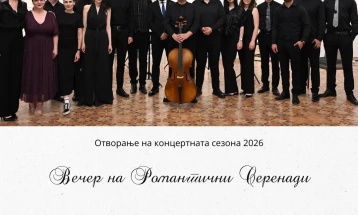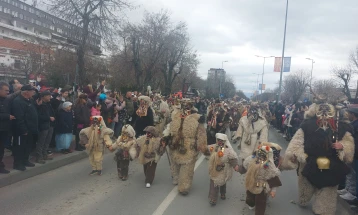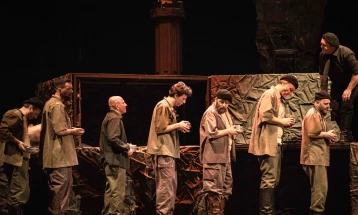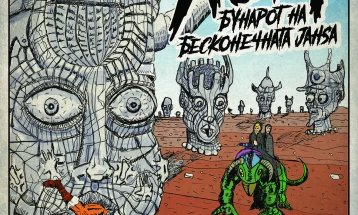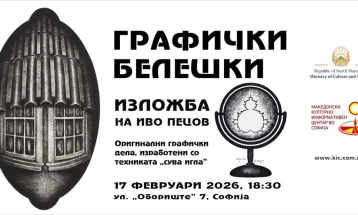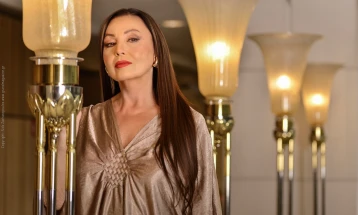Chifte Hammam hosts book launch for Macedonian translation of Gerald Raunig's 'Dividuum' and 'Dissemblage'
- As part of the CRIC Festival for Critical Culture, the National Gallery's Chifte Hammam is hosting on Thursday the book launch for the Macedonian translation of Gerald Raunig's latest books 'Dividuum' (2016) and 'Dissemblage' (2022), comprising the two volumes of his larger project called “Machine Capitalism and the Molecular Revolution”.
- Post By Nevenka Nikolik
- 09:39, 4 July, 2024
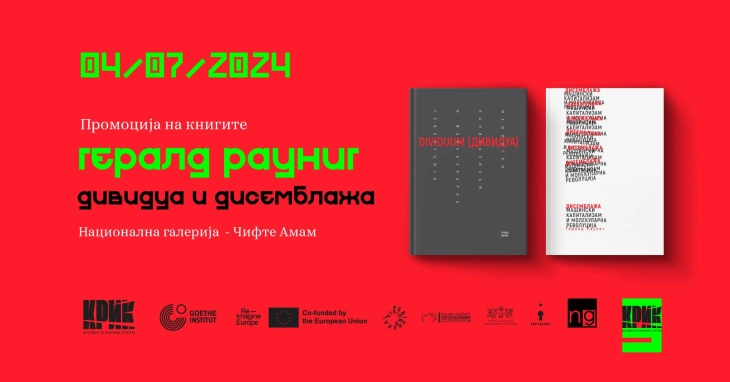
Skopje, 4 July 2024 (MIA) - As part of the CRIC Festival for Critical Culture, the National Gallery's Chifte Hammam is hosting on Thursday the book launch for the Macedonian translation of Gerald Raunig's latest books 'Dividuum' (2016) and 'Dissemblage' (2022), comprising the two volumes of his larger project called “Machine Capitalism and the Molecular Revolution”.
According to the CRIC festival, the two books are in an exceptionally in-depth, precise and complex translation by Zharko Trajanoski, published with the support of the Goethe Institute - Skopje, in the “Punktum” edition launched by Kontrapunkt in 2020, with the aim of stimulating contemporary critical theory, philosophy and theory of art and culture, through translations, but also through promotion of regional authors.
In 'Dividuum', Raunig walks us through an entangled history of individuality, society and community, and makes the case of the end of the centrality of “individuals” and “individuality” as cornerstones to our contemporaneous lived experiences and grasps of being communal and together. While the author recognizes the reactionary aspects of "dividuals" and "dividuality" as they conjugate with notions such as dispersion, subsistence, and similarity, he also offers a productive and positive rendering of what being a dividual means for us today and our socio-political situatedness.
Continuing some of those ideas in 'Dissemblage' and having already established a novel theoretical language around dividuality, in the second instalment of "Machine Capitalism and Molecular Revolution", Raunig continues to experiment with ideas, but also forms, of resistance and self-organizing by reinventing philosophical prose and theoretical writing. Drilling for inspiration to fuel resistances to contemporary capitalism and the exploitative capture of our energies, both queer thought and traditionalist common places are inventively fused together to defend a practice of multiple uprisings and dissemblages that transform our ideas of what a community could be.
Raunig will present his views through a dialogue with Bulgarian philosopher and theorist Stanimir Panayotov. During the moderated conversation, the meaning and influence of the key critical issues of our time will be reviewed: What transformation does machine capital describe? A response to what is the concept of dissemblage, and what is the political weight of an “assemblage”? Is the dividual a “better” form of the “self”? Is “dissemblage” in opposition to something else? And is aesthetics an impossible form of politics today?
Gerald Raunig is a philosopher and theorist. He works at eipcp (European Institute for Progressive Cultural Policies) as one of the editors of the multilingual publishing platform and as a professor of philosophy at Zürcher Hochschule der Künste. In the recent years, a significant part of Raunig’s time has been working and living in Malaga, Andalusia, where he researches and works with autonomous collectives and alternative forms of self-organization.
His books have been translated into English, Serbian, Spanish, Slovenian, Russian, Italian, Dutch, Turkish, and now into Macedonian by Kontrapunkt in it’s Punctum book edition, part of the CRIC platform-a festival for critical culture, and. Among the more significant books translated into English in recent times are: “Art and Revolution: Transversal Activism in the Long Twentieth Century”, translated by Aileen Derieg, New York/Los Angeles: Semiotext(e)/MIT Press 2007; “Art and Contemporary Critical Practice. Reinventing Institutional Critique”, London: mayflybooks 2009 (Ed., with Gene Ray); “A Thousand Machines”, translated by Aileen Derieg, New York/Los Angeles: Semiotext(e)/MIT Press 2010; “Critique of Creativity”, London: mayflybooks 2011 (Ed., with Gene Ray and Ulf Wuggenig); “Factories of Knowledge, Industries of Creativity”, translated by Aileen Derieg, New York/Los Angeles: Semiotext(e)/MIT Press 2013; “Dividuum: Mechanic Capitalism and Molecular Revolution Vol.1”, Vol.1, translated by Aileen Derieg, New York/Los Angeles: Semiotext(e)/MIT Press 2016; “Dissemblage: Mechanic Capitalism and Molecular Revolution Vol. 2”, “Minor Compositions” 2022. Forthcoming is “Making Multiplicity”, Polity Press 2024.
Stanimir Panayotov is a researcher at the Department of Literary Theory, Institute for Literature, Bulgarian Academy of Sciences. He holds a PhD in comparative gender studies from Central European University, Budapest and is also a postdoctoral fellow at the Department of Logic, Ethics, and Aesthetics in Sofia University, working on his project Nemopolitics (2023-2026). Previously, he was Assistant Professor in Philosophy and Cultural Studies (Tyumen, 2021-2023), a postdoctoral fellow at Center for Advanced Study in Sofia (Bulgaria, 2020-2021), and has taught various courses in humanities in Budapest, Jerusalem, Skopje, and Sofia. He works at the intersections of continental and feminist philosophy, non-philosophy, and late antique philosophy, and has published in the Minnesota Review, Aspasia, Heathen Harvest, and Metal Music Studies.
CRIC – Festival for Critical Culture is financially supported by the Goethe Institute, the Ministry of Culture of the Republic of North Macedonia and the Creative Europe program of the European Commission, financed by the European Union. However, the views and opinions expressed therein are those of the author(s) alone and do not necessarily reflect those of the European Union or the European Education Agency (EACEA). Neither the European Union nor the grantor can be held responsible for them. As well as, the Agenzia Italiana per la Cooperazione allo Sviluppo (AICS), Tirana in the framework of the project “Culture and Creativity for the Western Balkans” (CC4WBs), a project funded by the European Union that aims to encourage dialogue in the Western Balkans by strengthening cultural and creative sectors for increased socio-economic impact.
Photo: CRIC Festival for Critical Culture


